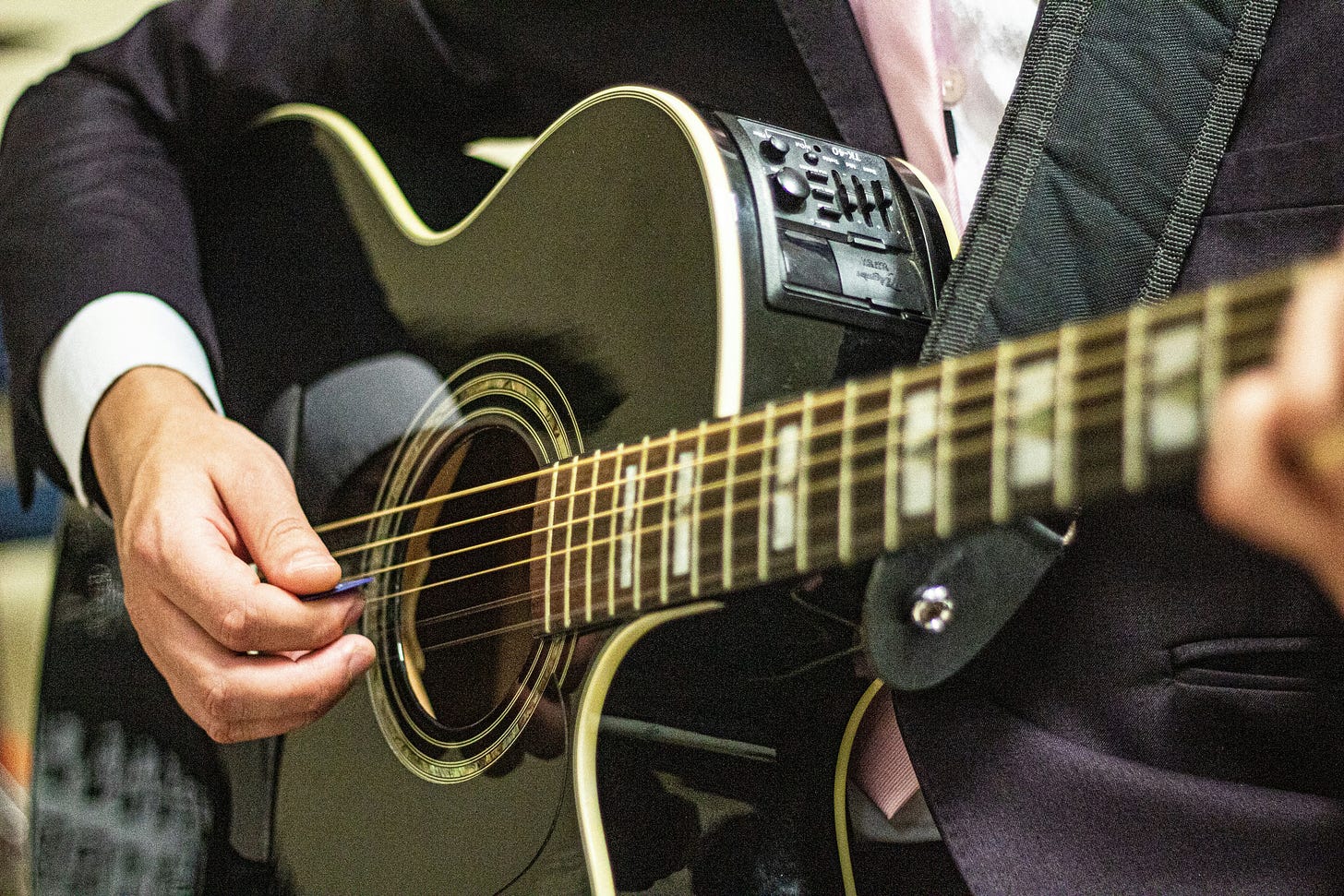
Feeling desperate, I moved back to my parents’ home in Minneapolis and encamped myself in their basement. I dedicated the next three months of my life to pizza, beer, and late-night television.
Then I started calling every local musician I knew to let them know I was back in town and looking for work. I left a lot of messages on answering machines (the current technology back then), saying that I’d be willing to take any gig at all as long as I got paid. Then I stared at the phone for hours at a time, waiting for people to respond. I was desperate.
Finally Russ called me back. He was another guitar player, a friend from high school.
“So, you’re off the road, huh?”
“Yes,” I said. “That kind of life is incompatible with staying sane — or even alive past age 40.”
Russ laughed. “You can say that again. So what are you looking to do next?”
“Pretty much anything,” I said, “though I’d prefer to play my instrument rather than sit in an office somewhere.”
“I can put you to work right away if you’re up for it. You won’t have to go to an office. But you will have to put on a suit.”
“I’d be willing to wear a clown costume,” I said. “Tell me more.”
“Well, I’ve started booking bands, you know. For private parties — wedding receptions, bar mitzvahs, anniversaries, retirement celebrations, country clubs, corporate parties. Stuff like that. One-off gigs here and there, all over town. No bars.”
“No bars,” I said. “These are two words I need to hear.”
“You got it,” Russ said. “These are real cushy gigs, too. All you have to do is put on a black bow tie and tuxedo, show up to the gig on time, and not play too loud. Your job is to smile, make nice, and play discreet little background music while people eat steaks and drink martinis. Nobody actually listens to you, but who cares, right? You get paid at the end of the gig and you get back home by midnight.”
“Wow. This is a real thing? People actually do this?”
“Hell, yeah. They do it four or five nights a week, even. It resembles a real job.”
“But if all they want is nice background noise, why don’t they just pump in some recorded music?”
“Hell if I know,” Russ said. “There’s something about having live musicians in the room. It’s a badge of prestige, I guess. You can hire the players and then point to them and say: See those guys playing over there? I own them. These are wealthy people you’re playing for, you know.”
“Got it,” I said. “So when do I start?”
“ASAP, brother.”
Russ gave me a long list of tunes to learn, such as Misty, In the Mood, String of Pearls and September in the Rain — the American Songbook, they call it. My job was to learn all those tunes in the standard keys. Once I did, I could play with any other musician who knew the same tunes, even if I’d never met that person before.
I did my homework. It took me two solid weeks, practicing eight hours per day. The fact that I could sustain this level of effort surprised me. But then again, there’s nothing like the prospect of starvation to focus a man’s attention.
I called Russ to let him know I was ready to play. And, good to his word, he put me to work. Thus began my new career as purveyor of inoffensive sounds for the economic elite.
All this took place a long time ago — the 1980s. And to enter the country clubs I played in was to travel decades even further back in time, back to the middle of the twentieth century. This was an era before television, before hip hop, before rock and roll, when people listened to the big bands led by Glen Miller, Benny Goodman, Woody Herman, Duke Ellington, and all their imitators.
Often during gigs I looked up from my instrument to notice the people in the room. They were older, mostly gray-haired, and overwhelmingly white. They drove large cars and lived in gated communities. In ten or twenty years, I said to myself, these folks will be dead or demented. They won’t come to parties like this anymore. The gigs will dry up, and we’ll all be out work. What will we do then?
As musicians we raised these questions, joked about the answers, and privately made fun of our geriatric audiences. But we also depended on them. Without these well-heeled patrons, we’d be back out on the road again.
My job, I reminded myself, was simply to show up on time, smile, and play my guitar. Don’t worry about being an artist, I told myself. Just be a craftsman. There’s dignity in that.
A craftsman has tools. My tools were scales and chords. I knew how to stay in tune and produce agreeable tones. This was no small accomplishment. I often reminded myself of this, especially during gigs. It helped to pass the time.



